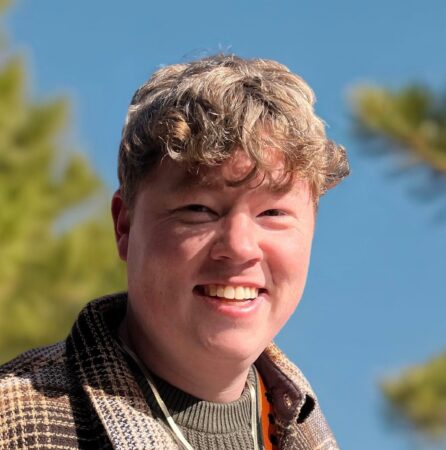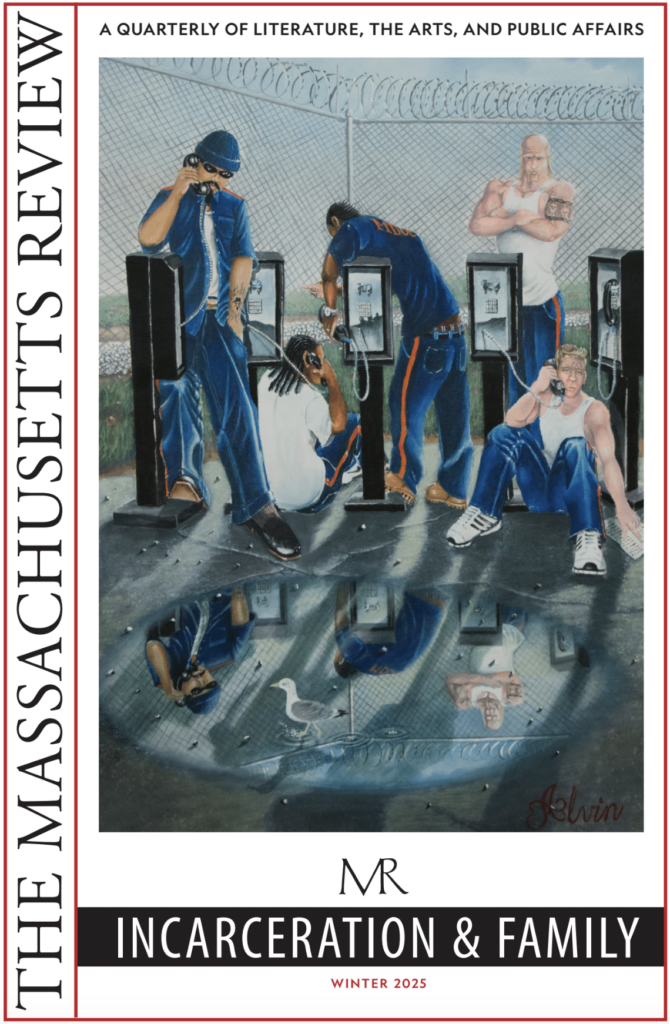10 Questions for Jake Phillips

I. Evolution
I dream of having wings. I fly in circles
above the woods, out back beyond
the gate. My father raises a rifle at me,
pulls the trigger. Shoots. Over & over
he misses, no matter how many times I
circle. The vacuum trailing each bullet, the wakes,
& how my feathers fold into them.
—from Jake Phillips’ “The Limitations of Science (Seven Tenets of Occult),” Volume 66, Issue 1 (Spring 2025)
Tell us about one of the first pieces you wrote.
I’ve kept notebooks in storage bins and migrated documents from computer to computer that date back as far as early elementary school—but the first notable piece I remember writing was a poem in fifth grade, roughly 2006. At the time, I was wearing Guy Fieri-esque flame-patterned silk shirts and cargo shorts and listening to Gwen Stefani and Britney on a 1st Generation iPod Nano. The poem was about the tears of a dragon, because of course it was, and it won my grade group’s poetry contest.
I thought about sharing other stories in place of this one—maybe the first poem I published or the first poem I felt truly proud of—but then I remembered that after winning that silly contest (a contest which, by the way, had absolutely no cash prize, publication, or even public recognition) I went onto the then-serif-fonted Google and searched for degree programs in creative writing. I learned what an MFA program was and told my homeroom and English teacher Ms. Gaudette the very next day that I wanted to go to one because I wanted to be a writer. And even though she’d just read my poem about a crying dragon, she didn’t laugh at me—she just gave me more to read, more to write. And I have spent every day since trying to repay that kindness and the journey it set me on and the writer she and so many other teachers and fellow writers and friends believed I could—have!— become.
What writer(s) or works have influenced the way you write now?
In spite of my previous response, I grew distant and disillusioned with poetry for many years, as so many of us who are taught a certain canon (dead, white, male) in school do—but then The BreakBeat Poets anthology changed how I looked at poetry and invited me back in. I discovered John Murillo, a genius of craft, who still guides me on control and exquisite sharpness and story and breath.
Danez Smith was my other gateway into the world of poetry. No other poet is so charming, so full of voice and life, for me. If my language loves—if it is vibrant and joyful and also still aching and tender—it is in gratitude and service to their work.
I am also eternally indebted to and influenced by Jill McDonough, the vivacious and tenacious teaching force at UMass Boston, who pushes me towards authenticity and precision and the earnest work of making and sometimes losing meaning. And also form, that beautiful thing we get for ourselves. As Jill would say: yay poetry!
Lastly, in my lineation and breaking, I always feel the impulse to write towards the enduring brilliance of Louise Glück. There is a long, long list of writers whose work I have been moved and changed by, but I feel especially altered by her work in recent years.
What did you want to be when you were young?
Always a writer, though I skewed towards fiction. In my moments of doubt, I did contemplate science-oriented careers—engineering, marine biology and ornithology for a while. I even interned at a veterinarian office for nearly a year toward the end of high school. But then I watched the lead vet put her own cat down, and that combined with the ghastly cost of vet school and job prospects that were equally abysmal to creative writing majors made me realize I should do the thing I’d always wanted to do.
What inspired you to write this piece?
I wrote this piece as part of a now-scrapped (or at least set aside, for now) project on tarot and occult studies. Composer and occultist Cyril Scott has a 1935 book titled An Outline of Modern Occultism; its second chapter, “The Limitations of Science” opens with a Mark Planck how science is “an aim which we are able to imagine but unable to reach intellectually,” and the chapter itself describes the power of occult knowledge—based on the seven tenets the poem is structured around—as the ability “to bring… potential powers into actual manifestation.” Using the themes from Planck’s epigraph and Scott’s idea of manifestation, I wanted to explore his seven occult tenets as I reflected on themes of evolution and some moments that defined my transition into a later state of being—a manifestation of adulthood, or deeper conscious, or understanding of universe.
It was also useful to play with the language of Scott’s prose; in the sixth tenet, for example, he talks about how “all beings both bodies and disembodied are storehouses and transformers of energy” and it was easy to make the connection to my close friend who’d passed away my sophomore year of high school—an event that massively shaped my evolution—as I thought about her energy in the universe, how her life had transformed my energy, and also, hilariously, the biology classes we’d shared together and laughed at hearing the classic mitochondria line everyone gets in a bio class. I found similar juxtapositions and tensions to explore within each tenet and each facet of growing up.
Is there a city or place, real or imagined, that influences your writing?
I’ve been inspired by the cities I’ve lived in—Boston, Providence—but lately I find myself most often responding to the small towns I grew up and now reside in, the rural and somewhat conservative pockets in the woodland areas of blue New England states. These places hold such a strange, almost surreal tension for me—a friction between nostalgia and disdain and love and appreciation and worry and anger and confusion. There’s a natural beauty and a growing appreciation for diversity, but there are a lot of terrifying and divisive voices, too—and they’re vocalizing hate more in recent years, of course. I grew up hiding my queerness from those voices completely; but now, in my work, I have a place to explore how I exist in and respond to these spaces in the current moment, in reinvented pasts, and in imagined futures.
Is there any specific music that aids you through the writing or editing process?If I do listen to music while working, I most often listen to a single song, or sometimes a tiny playlist of two to five songs, on repeat. I find that repetition helps the music become thematic background noise to write to, and then the ideas of the music come through in the piece.
Lately, I’ve been listening to a lot of Doechii. My spark for what I’m currently writing has been a three-song playlist from her mixtape Alligator Bites Never Heal and another five-song playlist that also includes a single song each from Pierce the Veil, PVRIS, Omar Apollo, and Frank Ocean. I’ll put those playlists on loop as I write and edit.
Do you have any rituals or traditions that you do in order to write?
A lot of my poems start from iPhone notes I jot down in moments where my mind can wander—while walking in the woods, showering, doing dishes, reading someone else’s work, sitting in a public space. Then I’ll sit down at my desk and work with the notes—sometimes revising them, sometimes rewriting them only from memory, sometimes introducing new source or research materials into them—until I have a more fully drafted piece. I also love to light incense before writing at my desk to really set a space for myself.
If you could work in another art form what would it be?
My gut reaction was to say oil painting, because I love the physicality and movement of it, especially when it’s done on large scales—but really, I’d love to be able to play the piano at a much higher level. I’m such an amateur but I appreciate the dedication of and talents piano virtuosos. I love hearing a well-commanded piano played with strength and delicacy, and I think composing music alongside poetry would introduce depth to the sonics and thought of both forms.
What are you working on currently?
I’m working on my first poetry collection! It uses deer and the cultures of hunting, mythology, and art surrounding them as a lens to discuss violence and beauty in Rhode Island and rural America. The poems center on gun ownership and gun violence, queerness and othering, political radicalism, and environmentalism, and I’m interested in how the collection can engage academic and non-academic communities to bridge gaps between ruralism and poetic academia. To write the book, I’ve been combining personal narratives with scientific research, local expertise and interviews, and cultural and artistic allusions, and hopefully leaving plenty of room for play and imagination.
What are you reading right now?
I’m always juggling a stack of books. For one of my book groups, I’m actually reading The Hobbit for the first time and loving it. The storytelling is so whimsical and great. On the side, my personal prose choice right now is Brat by Gabriel Smith, which I admittedly picked up because it had the right combination of a deer on the cover and a Charli XCX title, but its surrealism and humor are brilliantly written.
I’m also reading J. Scott Bryon’s Ecopoetry: A Critical Introduction to get an overview of the field. I recently paused my project of reading through Rhode Island’s past Poet Laureates to read June Jordan’s Passion (an absolutely stunning collection) in honor of her birthday and Tracy Fuad’s anxious and wonderful collection PORTAL after meeting her during my summer workshop week at the Fine Arts Work Center—so I think I’ll pick that project back up now and read Tina Cane’s Once More with Feeling and Rick Benjamin’s Some Bodies in the Grief Bed next.
JAKE PHILLIPS is a queer poet from Rhode Island. He is a poetry reader for The Adroit Journal, an alum of the Fine Arts Works Center summer workshop, and a recipient of a 2024 Make Art Grant from the Rhode Island State Council on the Arts. His poetry is published or forthcoming in AGNI, The Kenyon Review, Nimrod, Salt Hill, swamp pink, underblong, and elsewhere.



